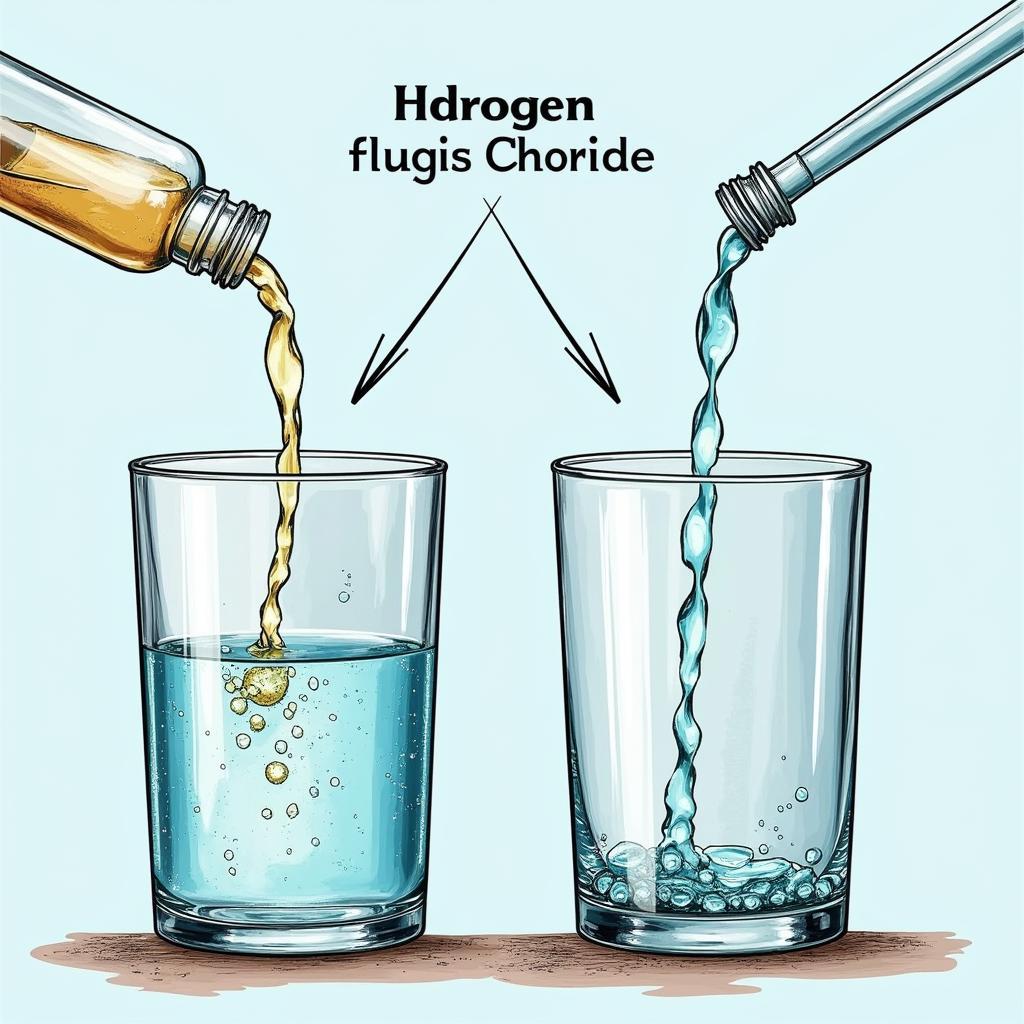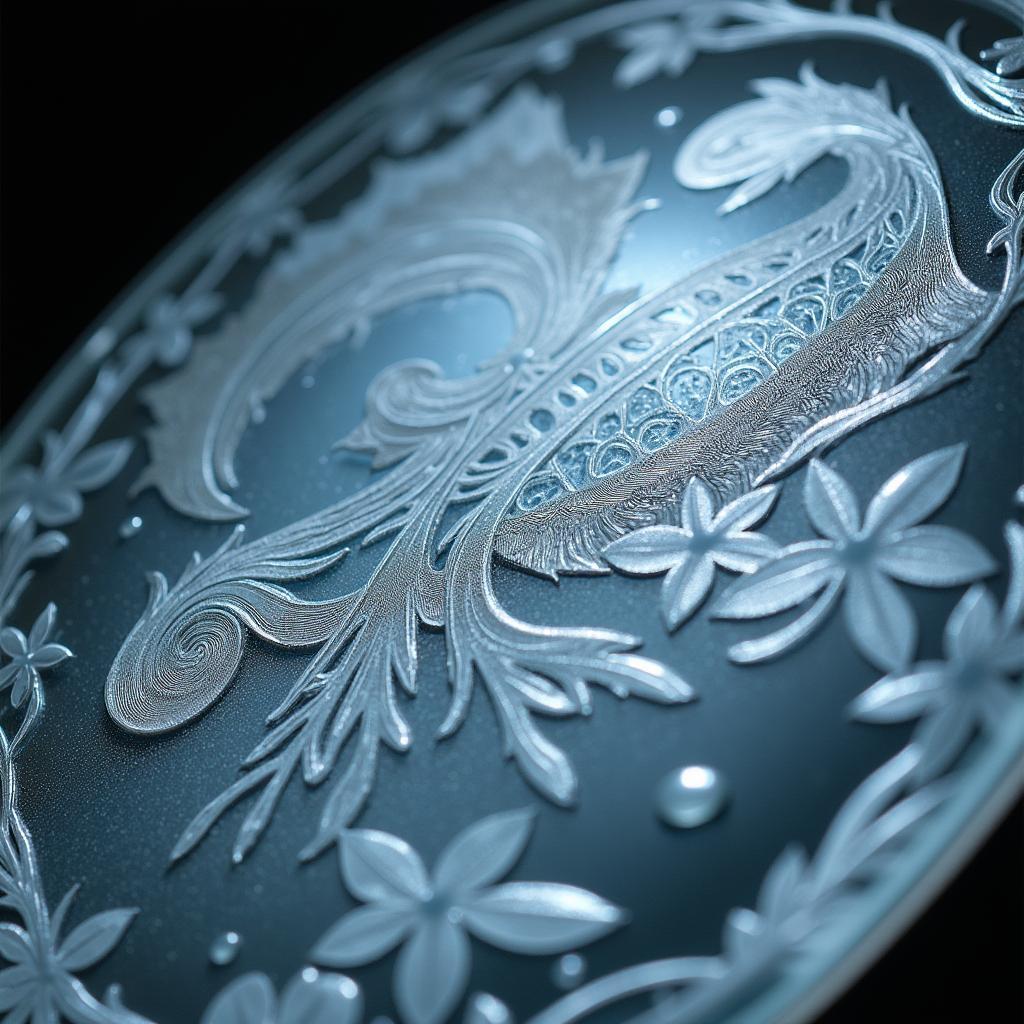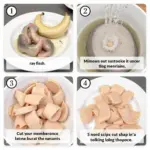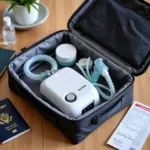Hydrogen fluoride (HF) is the gas that dissolves in water to form hydrofluoric acid, a solution capable of etching glass. This seemingly simple reaction has significant implications in various industries, from semiconductor manufacturing to artistic glass etching. Let’s explore the fascinating chemistry behind this process and its diverse applications.
Understanding the Reaction Between HF and Glass
When hydrogen fluoride gas dissolves in water, it forms hydrofluoric acid (HF). Unlike other acids, hydrofluoric acid reacts uniquely with glass, specifically with silicon dioxide (SiO2), the primary component of glass. This reaction produces silicon tetrafluoride (SiF4), a gaseous compound, and water. The reaction can be represented by the following chemical equation:
SiO2 (s) + 4 HF (aq) → SiF4 (g) + 2 H2O (l)
This reaction effectively dissolves the silicon dioxide, leading to the etching of the glass surface.
 Hydrogen Fluoride Etching Glass
Hydrogen Fluoride Etching Glass
Applications of Glass Etching with Hydrofluoric Acid
The ability of hydrofluoric acid to etch glass has led to its use in a wide range of applications:
Semiconductor Manufacturing: Hydrofluoric acid is crucial in the semiconductor industry for cleaning and etching silicon wafers. This precise etching is essential for creating the intricate circuits found in modern electronics.
Artistic Glass Etching: Artists utilize hydrofluoric acid to create beautiful and intricate designs on glass surfaces. This technique allows for detailed and controlled etching, producing stunning works of art.
Frosting Glass: Diluted solutions of hydrofluoric acid are used to create a frosted or etched appearance on glass, commonly seen in decorative glass items and bathroom windows.
 Artistic Glass Etching using Hydrofluoric Acid
Artistic Glass Etching using Hydrofluoric Acid
Safety Precautions when Handling Hydrofluoric Acid
Hydrofluoric acid is a highly corrosive and dangerous substance. Direct contact with skin can cause severe burns that may not be immediately painful. Inhaling hydrogen fluoride gas can also lead to respiratory problems. Therefore, strict safety precautions must be observed when handling hydrofluoric acid:
Protective Gear: Always wear appropriate personal protective equipment (PPE), including gloves, eye protection, and a respirator.
Ventilation: Work in a well-ventilated area to minimize the risk of inhaling hydrogen fluoride gas.
Neutralization: Have neutralizing agents readily available in case of spills or contact with skin.
What are the byproducts of the reaction?
The byproducts of the reaction between hydrofluoric acid and glass are silicon tetrafluoride (SiF4), a gas, and water.
Can other acids etch glass?
While other acids may react with glass, they do so at a much slower rate and are not as effective as hydrofluoric acid.
“Hydrofluoric acid’s unique ability to etch glass makes it an invaluable tool in various industries, but its hazardous nature requires extreme caution and proper handling,” says Dr. Emily Carter, a chemical engineer specializing in materials science. “Understanding the chemistry behind this reaction is crucial for both its effective application and safe usage.”
In conclusion, hydrogen fluoride is the gas that dissolves in water to form hydrofluoric acid, which effectively etches glass by reacting with silicon dioxide. This process has numerous applications, but safety precautions are paramount when handling this corrosive substance. Understanding the chemical reaction and safety measures allows for its safe and effective use in various fields.
FAQ
- What is the chemical formula of hydrofluoric acid? (HF)
- What is the primary component of glass that reacts with HF? (Silicon dioxide, SiO2)
- What are some common uses of glass etching? (Semiconductor manufacturing, artistic etching, frosting glass)
- Why is hydrofluoric acid dangerous? (Highly corrosive, can cause severe burns)
- What precautions should be taken when handling HF? (Wear PPE, work in a well-ventilated area, have neutralizing agents available)
- What is the gas produced when HF reacts with glass? (Silicon tetrafluoride, SiF4)
- Is hydrofluoric acid the only acid that can etch glass? (No, but it is the most effective)
Need support? Contact us at Phone Number: 0372960696, Email: TRAVELCAR[email protected] or visit our address: 260 Cau Giay, Hanoi. We have a 24/7 customer service team.

